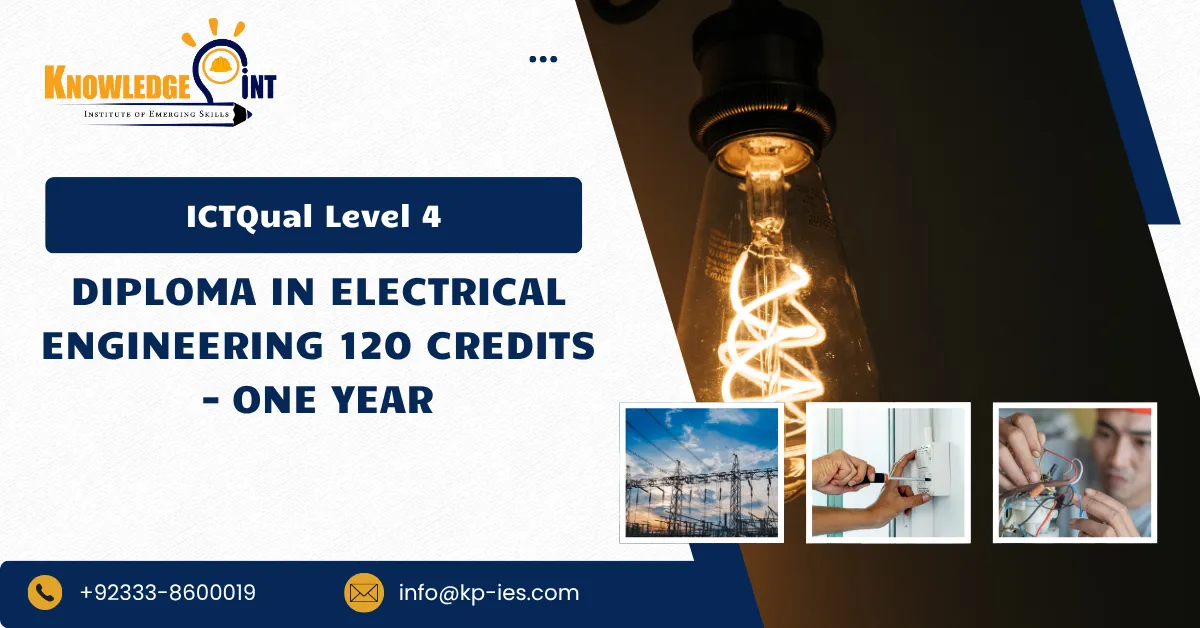In today’s fast-paced technological world, electrical engineers are at the forefront of innovation, driving advancements in everything from energy systems to automation and smart technologies. The ICTQual Level 4 Diploma in Electrical Engineering (120 Credits – One Year) provides students with a comprehensive introduction to the world of electrical engineering, offering the foundational knowledge and practical skills necessary for a successful career in this dynamic field.
The ICTQual Level 4 Diploma in Electrical Engineering is designed to equip students with the core principles and technical expertise needed to pursue a career in electrical engineering. The one-year program is ideal for those looking to build a strong foundation in electrical systems, circuits, and electrical machine principles. It serves as a stepping stone for those aiming to progress to higher qualifications in electrical engineering or embark on a professional career in the field.
The ICTQual Level 4 Diploma in Electrical Engineering offers an excellent starting point for those looking to enter the dynamic and ever-evolving field of electrical engineering. Whether you’re interested in power systems, automation, or digital electronics, this qualification provides the foundational knowledge and skills necessary to succeed. With a mix of theoretical understanding, practical training, and industry-relevant skills, this diploma is a stepping stone toward a rewarding and diverse career in electrical engineering.
Course Overview
The ICTQual Level 4 Diploma in Electrical Engineering consists of 12 mandatory units which are as follows.
- Electrical Principles
- Electrical Circuits and Systems
- Digital Electronics and Microprocessors
- Electrical Machines and Transformers
- Instrumentation and Control Systems
- Power Generation and Distribution
- Renewable Energy Systems
- Electrical Safety and Legislation
- Advanced Electrical Circuit Design
- Control and Automation Systems
- Project Management for Electrical Engineering
- Electrical Engineering Project (Capstone)
Learning Outcomes for ICTQual Level 4 Diploma in Electrical Engineering
Upon successful completion of the ICTQual Level 4 Diploma in Electrical Engineering, students will have gained the knowledge, skills, and expertise necessary to excel in the electrical engineering field. The learning outcomes are structured around foundational principles, intermediate proficiency, and advanced specialization, ensuring comprehensive expertise in electrical engineering.
1. Electrical Principles
- Understand the fundamental principles of electricity, voltage, current, resistance, and power.
- Apply Ohm’s Law and Kirchhoff’s Laws to analyze basic electrical circuits.
- Demonstrate knowledge of alternating current (AC) and direct current (DC) systems and their respective characteristics.
- Identify different types of electrical components and their functions in circuits.
2. Electrical Circuits and Systems
- Analyze and design simple electrical circuits using series, parallel, and combination configurations.
- Understand the principles of circuit analysis including power, voltage drops, and current flow in AC and DC circuits.
- Utilize tools for troubleshooting and maintaining electrical systems in various applications.
3. Digital Electronics and Microprocessors
- Comprehend the principles of digital logic design, including Boolean algebra and logic gates.
- Design and analyze digital circuits such as adders, multiplexers, and flip-flops.
- Understand the functionality and applications of microprocessors and microcontrollers in electrical systems.
- Program and interface microprocessors to perform basic control functions.
4. Electrical Machines and Transformers
- Understand the operating principles of electrical machines, including transformers, motors, and generators.
- Calculate the performance parameters of electrical machines and transformers, such as efficiency, power factor, and load.
- Analyze the applications of transformers in electrical power systems, focusing on voltage regulation and energy loss minimization.
5. Instrumentation and Control Systems
- Learn the principles of electrical measurement techniques, including voltage, current, and power measurement.
- Understand the components and operation of control systems used to regulate electrical systems and processes.
- Design and implement basic control systems using sensors, actuators, and controllers.
6. Power Generation and Distribution
- Gain a comprehensive understanding of different methods of electrical power generation, including fossil fuels, nuclear, and renewable energy.
- Analyze power generation systems and their role in the electricity grid.
- Understand electrical transmission and distribution systems, including transformers, switchgear, and protection systems.
7. Renewable Energy Systems
- Examine various renewable energy sources, including solar, wind, and hydroelectric power.
- Analyze the integration of renewable energy systems with existing electrical grids.
- Evaluate the efficiency, environmental impact, and sustainability of renewable energy technologies.
8. Electrical Safety and Legislation
- Understand and apply safety standards and regulations related to electrical engineering.
- Identify the risks and hazards associated with electrical systems and apply proper safety protocols.
- Be familiar with legislation governing electrical installations, including national and international standards.
9. Advanced Electrical Circuit Design
- Design and analyze advanced electrical circuits for complex systems such as power electronics and automation.
- Utilize advanced tools and software for simulating and testing electrical circuits.
- Optimize circuit design for efficiency, cost, and safety.
10. Control and Automation Systems
- Understand the fundamentals of industrial automation and control systems.
- Design and implement automated electrical systems for industrial processes using PLCs, SCADA, and other control technologies.
- Analyze control loops, feedback systems, and PID controllers in automation applications.
11. Project Management for Electrical Engineering
- Develop skills in planning, organizing, and managing electrical engineering projects.
- Understand the principles of project management, including scope, cost, and time management.
- Apply tools and techniques for risk management, quality control, and resource allocation in electrical engineering projects.
12. Electrical Engineering Project (Capstone)
- Demonstrate the ability to apply theoretical knowledge and practical skills to a real-world electrical engineering project.
- Conduct research, design, and implement an electrical system or solution to address a specific problem or challenge.
- Communicate project outcomes effectively, including written reports and presentations, and evaluate the technical and financial aspects of the project.
Course Benefits of the ICTQual Level 4 Diploma in Electrical Engineering
The ICTQual Level 4 Diploma in Electrical Engineering (120 Credits – One Year) offers a range of significant benefits for students and professionals looking to advance their careers in electrical engineering. Here are the key benefits of this course:
1. Comprehensive Knowledge Base
- This course provides a solid foundation in the fundamental principles of electrical engineering, including electrical circuits, power systems, control systems, and digital electronics. Students gain knowledge in both theoretical and practical aspects, ensuring they are well-equipped to handle complex engineering problems.
2. Industry-Relevant Skills
- Students develop technical skills directly applicable to the electrical engineering industry, including proficiency in electrical design, system analysis, instrumentation, and control systems. These skills are highly valued by employers in sectors such as energy, manufacturing, telecommunications, and automation.
3. Hands-On Practical Experience
- The course emphasizes practical learning, with students gaining hands-on experience in designing and troubleshooting electrical circuits, systems, and control mechanisms. This practical knowledge ensures students are ready for real-world applications and problem-solving.
4. Exposure to Advanced Technologies
- The program covers advanced topics such as renewable energy systems, power electronics, and automation technologies. This exposure enables students to stay ahead of industry trends, making them competitive candidates in the job market, especially in areas like green energy and smart grids.
5. Project Management Skills
- The inclusion of project management training allows students to develop essential skills in planning, organizing, and executing engineering projects. These skills are crucial for career advancement, as they demonstrate the ability to handle large-scale projects efficiently.
6. Understanding of Industry Standards and Legislation
- Students are introduced to electrical safety, industry regulations, and relevant legislation. This ensures they are compliant with safety standards and industry requirements, making them responsible professionals who can manage risks and adhere to legal guidelines.
7. Pathway to Advanced Education and Careers
- Graduates of the ICTQual Level 4 Diploma can further progress to higher-level qualifications such as the Level 5 or Level 6 Diplomas in Electrical Engineering. They can also pursue Bachelor’s degree programs in electrical engineering or related fields. Additionally, the diploma opens doors to a wide range of job opportunities in electrical engineering, including roles in design, systems analysis, and project management.
8. Capstone Project for Real-World Application
- The capstone project enables students to apply their learning to solve real engineering problems, demonstrating their ability to innovate and develop practical solutions. It also provides a strong portfolio piece for students to showcase to potential employers.
9. Improved Career Prospects
- By completing this diploma, students increase their employability in the electrical engineering sector. The qualification is recognized by employers worldwide, ensuring that graduates have a competitive edge in the job market.
10. Flexibility for Professional Development
- The course is designed to accommodate both full-time students and working professionals. With flexible study options, students can enhance their skills while balancing other commitments, making it ideal for career changers or those looking to upgrade their qualifications.
Future Progression After ICTQual Level 4 Diploma in Electrical Engineering
The ICTQual Level 4 Diploma in Electrical Engineering offers excellent opportunities for future progression, both in terms of further education and career development. Below are the key progression pathways for graduates of this course:
1. Progression to Higher-Level Qualifications
- Level 5 or Level 6 Diplomas in Electrical Engineering: After completing the Level 4 Diploma, students can continue their education by pursuing higher-level diplomas, which provide deeper knowledge and specialization in electrical engineering fields such as power systems, control systems, automation, and renewable energy.
- Bachelor’s Degree in Electrical Engineering or Related Fields: Graduates can gain entry into a Bachelor’s degree program in Electrical Engineering or related disciplines, often with advanced standing or credit for prior learning. This path offers the opportunity to further enhance qualifications and improve career prospects.
2. Specialization and Certifications
- Specialized Certification Courses: Graduates can pursue certifications in areas such as power electronics, automation, renewable energy, or industrial control systems. These specialized courses can help individuals focus on niche areas of electrical engineering and increase their marketability in specific industries.
- Professional Engineer (PE) Certification: For those aiming for professional recognition, obtaining a PE certification (depending on country-specific regulations) is a significant career milestone. This certification demonstrates technical expertise and can lead to leadership roles in engineering projects.
3. Career Advancement in Electrical Engineering
Graduates of the Level 4 Diploma can progress into a variety of roles within the electrical engineering sector, with opportunities for both technical and managerial career paths:
- Electrical Design Engineer: Focus on designing electrical systems for buildings, infrastructure, or industrial applications.
- Control Systems Engineer: Work on the design, implementation, and maintenance of automated control systems for manufacturing or processing plants.
- Renewable Energy Engineer: Specialize in the design and implementation of renewable energy systems, including solar, wind, and energy storage technologies.
- Power Systems Engineer: Engage in the analysis, design, and optimization of electrical power distribution systems, including grids and substations.
- Project Manager: Manage large electrical engineering projects, overseeing teams, budgets, and schedules.
- Electrical Maintenance Engineer: Maintain and troubleshoot electrical systems and equipment in industrial, commercial, or residential settings.
4. Entrepreneurial Opportunities
- Starting Your Own Business: Graduates with an entrepreneurial spirit can leverage their skills and qualifications to start their own engineering consulting or service company, offering design, maintenance, or energy efficiency solutions.
- Innovation in Green Technologies: With the increasing demand for sustainable energy solutions, graduates can specialize in renewable energy technologies or energy-efficient system design, making significant contributions to the green energy sector.
5. Opportunities in Other Engineering Fields
- Mechatronics or Robotics: With a background in electrical engineering, graduates may choose to branch into the rapidly growing fields of mechatronics or robotics, where electrical and mechanical systems intersect.
- Automation and Industrial Engineering: The skills learned in control systems and automation during the Level 4 Diploma can be applied to industries that rely heavily on automation, including manufacturing, automotive, and robotics.
6. Continuous Professional Development
- Engage in Lifelong Learning: The electrical engineering field is constantly evolving, and graduates can continue their learning journey by attending workshops, industry conferences, and advanced training programs. This continuous professional development ensures that graduates remain at the forefront of industry advancements and technologies.







